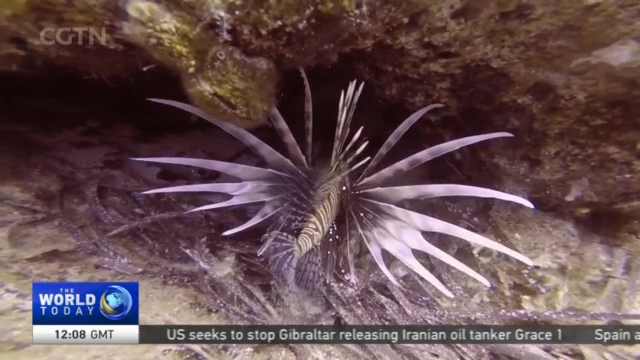
20:53, 15-Aug-2019
Invasive Species: The Mediterranean's popular but deadly resident
Updated
21:30, 15-Aug-2019

Before we go, a quick trip to the Mediterranean Sea. There's a fish there that's popular among scuba divers. But it's also threatening to unbalance the entire region's underwater system. CGTN's Stephanie Freid dives in to find out.
If this seems harsh, consider the alternative.
LOUIS HADJIOANNOU MARINE RESEARCHER, ENALIA PHYSIS, CYPRUS "50 to 60 percent of the native fish disappeared, seriously ecological damage. Potentially dangerous for fishermen. Potentially dangerous for beachgoers and dangerous for the diving industry."
The Lionfish isn't supposed to be in the Mediterranean - scientists believe at least one person threw the venomous fish into the sea when it outgrew a home aquarium sparking an invasion threatening the Mediterranean's entire eco-balance.
LOUIS HADJIOANNOU MARINE RESEARCHER, ENALIA PHYSIS, CYPRUS "Cyprus, Israel, Syria, We know that they're there. The southern coast of Turkey, Greece, Crete, up to Tunisia, Malta and Sicily."
"They're highly adaptable, they have few natural predators and they proliferate, quote, "like rabbits". Female lionfish can produce 30-thousand eggs per year."
STEPHANIE FREID PARALIMNI, CYPRUS "The lionfish invasion is a problem all over the world. Here in the Mediterranean, Cyprus is the frontline of defence."
The fish ate up native species, wreaking havoc off the Florida and Caribbean coasts, so researchers like Louis are studying - and culling the fish - to control proliferation. They're also encouraging fishers and consumers to catch and consume Lionfish. Once the venomous spines are clipped, it's only a matter of creativity in the kitchen. But not everyone favors culling.
WERNER WOLF DIVEMASTER, Q DIVERS, CYPRUS "You are there with your customers and there are five spearguns around you and they don't look. They just 'Oh, there's one.' And they just shoot. Twenty years everyone said, 'look, don't touch'. And suddenly divers are asked to kill fish. It's against what we said for 20 years."
Cyprus researchers estimate they're culling a few hundred Lionfish per month - as average sea temperatures heat up, fish numbers are expected to increase. Is hunting them an exercise in futility?
LOUIS HADJIOANNOU MARINE RESEARCHER, ENALIA PHYSIS, CYPRUS "We cannot just stand there and witness this. We have to at least give it a try. And then the future will show."
Stephanie Freid, CGTN, Paralimni, Cyprus.
SITEMAP
Copyright © 2018 CGTN. Beijing ICP prepared NO.16065310-3
Copyright © 2018 CGTN. Beijing ICP prepared NO.16065310-3